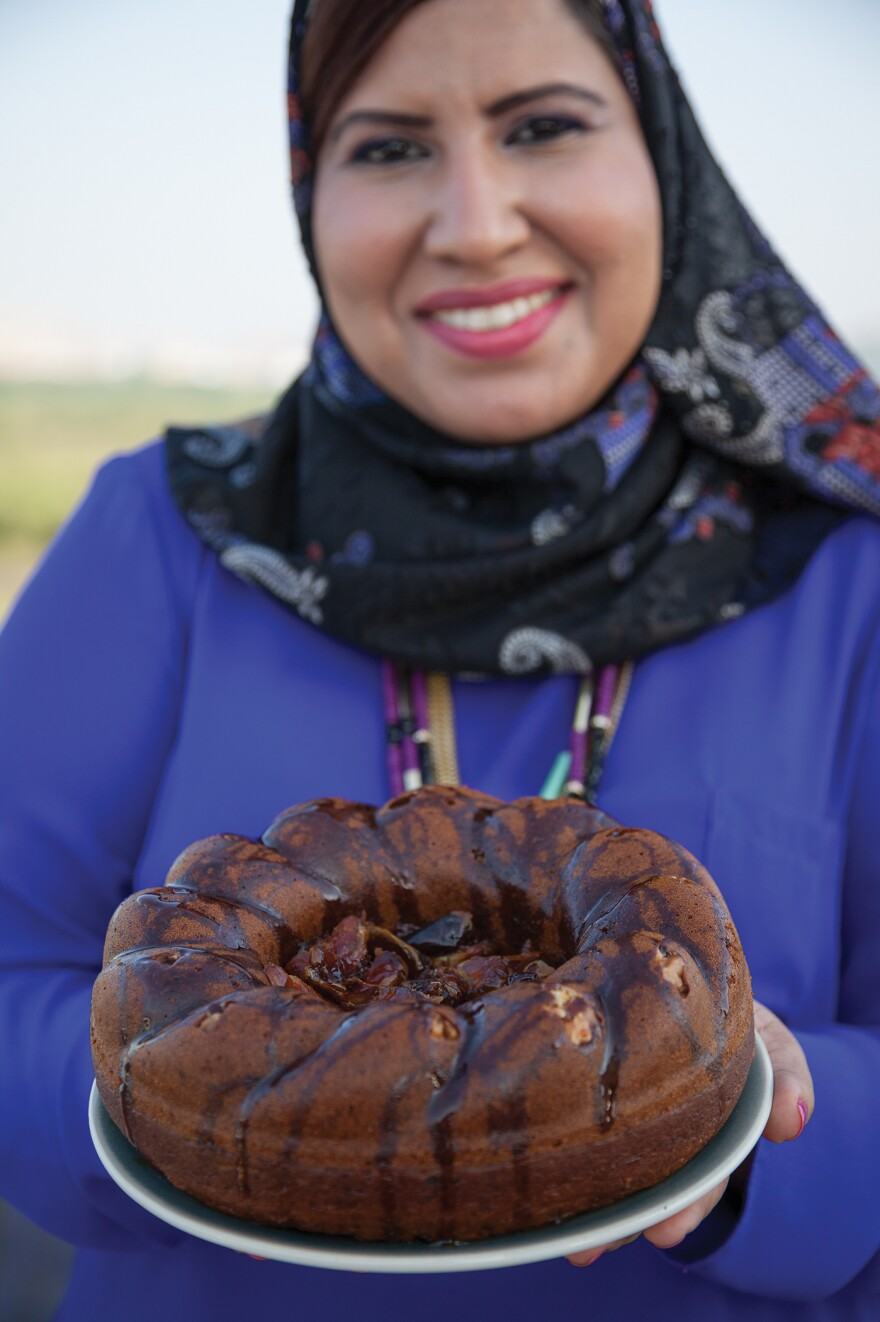Setting out to cook a meal from Felicia Campbell's new book, The Food of Oman, can take you to a range of places: Middle Eastern grocers (black limes, rosewater), Asian markets (powdered coconut milk), and even the hardware store (a paint chipper, the closest hack for the tool used to make the region's distinctive flatbread).
As this varied shopping list hints, Oman is a small country whose history and geography have opened it up to flavors far beyond its borders.
"It's probably the most surprising food I've ever come across, but also the most accessible," Campbell says of Omani cuisine.
Oman lies at the historic intersection of Asian and African trade routes, as well as caravan routes to the eastern Mediterranean. It was colonized by Portugal, and then became an imperial power of its own, extending control (and its capital city) all the way to Zanzibar. Walking down an Omani street, you can hear Arabic, Swahili, English or Urdu. And all of this comes through in its food. (Despite this diversity of influences, Oman is also a surprisingly insular country, where even marrying a non-citizen requires government approval.)
Campbell first traveled to the region over a decade ago, when she deployed with the U.S. Army. Recently, she spent a year working her way into Omani kitchens throughout the country, and now lives in the capital, Muscat.

We spoke with Campbell about the flavors, culture, and history of this little-known cuisine. Here's part of our conversation, edited for brevity and clarity.
What sets the food of Oman apart from the rest of the region?
There is no hummus or falafel in Oman — it's these really interesting fusion dishes. Oman is positioned at the crossroads of the spice routes. And so for centuries, there's been a lot of interaction with traders from South Asia, East Africa, Persia, and even the Far East. So they have dishes like vegetables simmered in coconut milk with hot chilies and lime. They've got their own version of biryanis [India's richly spiced, layered rice dishes]. And then the traditional rice dishes that you would find in the rest of the gulf — they have those, but they're much more flavorful, because they use all these different spices from around the world.
You've got all these foreign influences, but what of the cuisine is homegrown? Is there much there that's cultivated versus imported?
Almost everything is imported — they were definitely the merchants. The only really super-local ingredients are dates and fish. Because it's a coastal country, they have amazing seafood that they eat fresh, and also dried and salted.
If you had to come up with just a handful of items, what defines the Omani flavor palette?
One of the most distinctive ingredients is black limes. Those were fresh limes that were brought from Malaysia that they would lay out on mats to dry, so that they wouldn't spoil on caravan trips or sea journeys to other places — and it ended up creating an entirely new ingredient. The outside gets hard, but when you break it open, the flesh is black and kind of gummy, and it has this wonderful tart, almost fermented flavor. And that ingredient is now used in Persian cooking, and in the cooking of Basra, which was a major trading partner.

So that's one, and the other would be cloves. Zanzibar was part of Oman until 1965, and they had massive clove plantations there — they were the biggest clove exporter for years.
How is Omani food tied into the culture?
Food is really important in Oman, because family is really important. Typically, families come together and have a big meal off a communal platter of rice, and some meat or fish — either every day, or at least every Friday. People feel like they haven't eaten at all if they haven't had a big rice lunch. It's a nice time to be together.
Were people open to sharing their recipes with you?
They were — it took a long time, though. It's a place where everything is built around personal relationships. So I had to kind of put aside my New York efficiency when I went there. I initially tried to set up as many appointments as I could, but that was pointless. What it really involved would be sitting, and having tea with somebody, and coffee, and getting to know them, and then waiting for them to invite us. This was a very long process of going back and forth.
What's the hardest Omani recipe or technique to master?
Well the hardest recipe, for me, because I'm not a very patient cook, is the Zanzibari biryani [a dish involving spiced poached chicken, fried onions, a rich gravy and rosewater- and saffron-scented rice], because you have to make all the different elements separately. And it just takes hours and hours, and then you layer everything together, and it steams. And it's delicious, and really unique — but it takes forever.
The other tricky technique was to make their bread. Omani bread, it's a very elastic dough that [you] literally just touch to a searing hot pan, and it sticks, and as soon as it's crisp, you have to chip it off with a paint chipper, to get this paper-thin bread. And you have to be quick. It's easy once you get the hang of it, but that's what I almost burned down the kitchen with today.
A lot of people have barely heard of Oman, let alone its food. What would you most like people to know about Omani cuisine?
The wonderful thing about it is that it uses all the spices that you already have in your pantry, or you could find in any supermarket in Middle America — but in such a unique way that you're rediscovering flavors that you thought you already knew.
Copyright 2023 NPR. To see more, visit https://www.npr.org.



